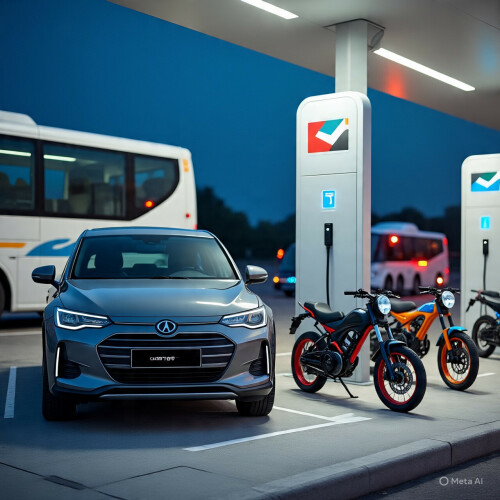Pakistan Unveils National Electric Vehicle Policy 2025-30
The government of Pakistan officially introduced the National Electric Vehicle (NEV) Policy 2025-30 on Thursday.
During the launch event, the Special Assistant to the Prime Minister on Industries and Production, Haroon Akhtar Khan, described the policy as a “significant and revolutionary measure” towards industrial, environmental, and energy improvements in Pakistan, according to an official statement from the Ministry of Industries and Production.
Khan emphasised that the new EV policy aligns with the Prime Minister’s objective to encourage environmentally friendly, sustainable, and accessible transportation, while also boosting local industries and protecting the environment.
He highlighted the transport sector’s substantial contribution to carbon emissions in Pakistan and stressed the necessity for reforms in this domain.
Key Objectives and Projections
Khan noted that a primary goal of the policy is to ensure that electric vehicles constitute 30% of all new vehicle sales in Pakistan by 2030.
This transition is expected to conserve 2.07 billion litres of fuel annually, resulting in approximately $1 billion in savings in foreign exchange.
Furthermore, the policy aims to decrease carbon emissions by 4.5 million tons and reduce healthcare expenses by $405 million each year.
Khan announced an initial subsidy of Rs9 billion for the fiscal year 2025-26, which will support 116,053 electric bikes and 3,171 electric rickshaws.
Inclusivity and Transparency
“Significantly, 25% of the subsidy is earmarked for women, providing them with secure, affordable, and environmentally sound transportation options.”
He also mentioned the introduction of a fully digital platform to guarantee transparent online application, verification, and subsidy distribution processes.
Infrastructure and Urban Integration
The policy includes plans to install 40 new EV charging stations along motorways, spaced approximately 105 kilometers apart.
Moreover, it promotes the implementation of battery swapping systems, vehicle-to-grid (V2G) technologies, and the mandatory integration of EV charging points in new building regulations to facilitate broader adoption in urban environments.
Support for Local Manufacturing
To stimulate local production, incentives are being offered to domestic manufacturers. The ministry noted that currently, over 90% of the components for two- and three-wheeled vehicles are already produced locally.
The government intends to introduce specialized support packages for small and medium enterprises (SMEs) to further enhance localisation. The Automotive Industry Development and Export Plan (AIDEP) tariff facility will remain in effect until 2026 and will be gradually phased out by 2030.
Policy Development and Review
Khan highlighted that the NEV policy was formulated through discussions with more than 60 experts, institutions, and industry stakeholders, guided by a steering committee under the Ministry of Industries and Production since September 2024.
The steering committee will conduct monthly and quarterly review meetings, and the Auditor General of Pakistan will perform a performance audit every six months.
Khan emphasised that the NEV policy is not just an environmental advancement but also a base for industrial expansion, local job creation, energy conservation, and technological independence in Pakistan.
He voiced his expectation that federal and provincial governments, the private sector, and citizens will collaborate to achieve “this vision of a clean, modern, and sustainable transport system.”
Economic and Environmental Impact
Khan reiterated that the policy represents a significant step towards clean energy, sustainable transportation, and industrial progress.
“It offers an all-encompassing and results-oriented strategy aimed at steering Pakistan towards a cleaner and more sustainable future.”
He also pointed out that locally manufactured goods are 30-40% less expensive than imported alternatives. In the two-wheeler sector alone, local production now accounts for over 90% of components.
“Considering Pakistan’s susceptibility to climate change, the EV policy will greatly aid in meeting global carbon reduction targets.”
The policy is projected to yield savings of around Rs800 billion over the next 24-25 years through decreased fuel imports, the utilization of affordable electricity, and revenue generated from carbon credits.
“Charging vehicles with electricity will also lower capacity payments from Rs174 billion to Rs105 billion, and carbon credits could generate approximately Rs15 billion in revenue.”
The nation’s total energy demand for EVs over the next five years is anticipated to be 126 terawatt-hours, which could be satisfied using the existing surplus in the national grid.
An electric rickshaw or bike user is expected to recoup their initial investment within 1 year and 10 months due to the lower charging costs compared to gasoline.
For example, if the additional cost of an electric bike is Rs150,000, “this can be recovered in less than two years through fuel savings.”
Khan concluded by noting that the government has also provided exemptions on customs duties and sales tax on EV parts to support the local industry.
“This policy should be fully embraced by Pakistan, as it is a transformative measure for our economy, environment, and industrial sector.”



Comments (0)
No comments yet. Be the first to comment!
Leave a Comment